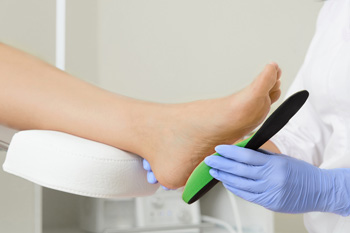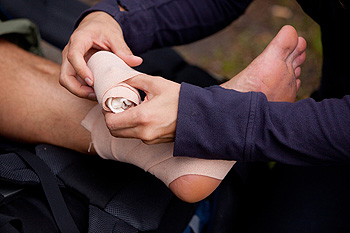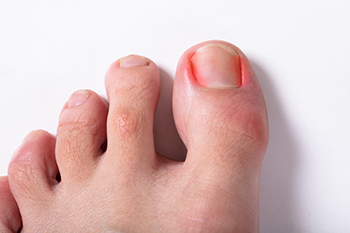March 2021
When Will My Plantar Fasciitis Go Away?
 Plantar fasciitis, a common overuse injury that results in inflammation of the ligament that runs along the bottom of the foot, can be a very painful and persistent ailment. The most common symptom of plantar fasciitis is intense heel pain that is usually at its worst upon taking your first steps in the morning. Without treatment, plantar fasciitis can worsen over time and can cause foot pain that interferes with daily activities. Full recovery from plantar fasciitis can take between 6 to 8 weeks, and in some cases may take several months. Treatments for this condition are typically conservative and involve resting and icing the foot, modifying your activities and footwear, and taking anti-inflammatory medications to reduce pain. If you have plantar fasciitis, please seek the care of a podiatrist.
Plantar fasciitis, a common overuse injury that results in inflammation of the ligament that runs along the bottom of the foot, can be a very painful and persistent ailment. The most common symptom of plantar fasciitis is intense heel pain that is usually at its worst upon taking your first steps in the morning. Without treatment, plantar fasciitis can worsen over time and can cause foot pain that interferes with daily activities. Full recovery from plantar fasciitis can take between 6 to 8 weeks, and in some cases may take several months. Treatments for this condition are typically conservative and involve resting and icing the foot, modifying your activities and footwear, and taking anti-inflammatory medications to reduce pain. If you have plantar fasciitis, please seek the care of a podiatrist.
Plantar fasciitis can be very painful and inconvenient. If you are experiencing heel pain or symptoms of plantar fasciitis, contact Dr. Robert Graser from Graser Podiatry and Bunion Surgery Institute. Our doctor can provide the care you need to keep you pain-free and on your feet.
What Is Plantar Fasciitis?
Plantar fasciitis is the inflammation of the thick band of tissue that runs along the bottom of your foot, known as the plantar fascia, and causes mild to severe heel pain.
What Causes Plantar Fasciitis?
- Excessive running
- Non-supportive shoes
- Overpronation
- Repeated stretching and tearing of the plantar fascia
How Can It Be Treated?
- Conservative measures – anti-inflammatories, ice packs, stretching exercises, physical therapy, orthotic devices
- Shockwave therapy – sound waves are sent to the affected area to facilitate healing and are usually used for chronic cases of plantar fasciitis
- Surgery – usually only used as a last resort when all else fails. The plantar fascia can be surgically detached from the heel
While very treatable, plantar fasciitis is definitely not something that should be ignored. Especially in severe cases, speaking to your doctor right away is highly recommended to avoid complications and severe heel pain. Your podiatrist can work with you to provide the appropriate treatment options tailored to your condition.
If you have any questions please feel free to contact our office located in Boerne, . We offer the newest diagnostic and treatment technologies for all your foot and ankle needs.
How Do Orthotics Work?
 Orthotics are specially designed shoe inserts that help correct imbalances and provide additional support to the feet. They can be purchased over the counter or be custom made by a podiatrist. Orthotics can help provide relief from a variety of conditions such as corns, calluses, ulcerations, tendonitis, heel pain, recurring stress fractures, and even hip and lower back pain. Since orthotics are designed to address specific problems, they can work in various ways that include relieving pressure by redistributing body weight or by providing extra shock absorption. Patients who believe that orthotics may help relieve their foot and ankle issues should consult with a podiatrist. A podiatrist looks at a variety of factors, such as the foot’s structure and function, biomechanics and lifestyle factors, to determine the right fit for each individual patient.
Orthotics are specially designed shoe inserts that help correct imbalances and provide additional support to the feet. They can be purchased over the counter or be custom made by a podiatrist. Orthotics can help provide relief from a variety of conditions such as corns, calluses, ulcerations, tendonitis, heel pain, recurring stress fractures, and even hip and lower back pain. Since orthotics are designed to address specific problems, they can work in various ways that include relieving pressure by redistributing body weight or by providing extra shock absorption. Patients who believe that orthotics may help relieve their foot and ankle issues should consult with a podiatrist. A podiatrist looks at a variety of factors, such as the foot’s structure and function, biomechanics and lifestyle factors, to determine the right fit for each individual patient.
If you are having discomfort in your feet and would like to try orthotics, contact Dr. Robert Graser from Graser Podiatry and Bunion Surgery Institute. Our doctor can provide the care you need to keep you pain-free and on your feet.
What Are Orthotics?
Orthotics are inserts you can place into your shoes to help with a variety of foot problems such as flat feet or foot pain. Orthotics provide relief and comfort for minor foot and heel pain but can’t correct serious biomechanical problems in your feet.
Over-the-Counter Inserts
Orthotics come in a wide variety of over-the-counter inserts that are used to treat foot pain, heel pain, and minor problems. For example, arch supports can be inserted into your shoes to help correct overarched or flat feet, while gel insoles are often used because they provide comfort and relief from foot and heel pain by alleviating pressure.
Prescription Orthotics
If over-the-counter inserts don’t work for you or if you have a more severe foot concern, it is possible to have your podiatrist prescribe custom orthotics. These high-quality inserts are designed to treat problems such as abnormal motion, plantar fasciitis, and severe forms of heel pain. They can even be used to help patients suffering from diabetes by treating foot ulcers and painful calluses and are usually molded to your feet individually, which allows them to provide full support and comfort.
If you are experiencing minor to severe foot or heel pain, it’s recommended to speak with your podiatrist about the possibilities of using orthotics. A podiatrist can determine which type of orthotic is right for you and allow you to take the first steps towards being pain-free.
If you have any questions please contact our office located in Boerne, . We offer the newest diagnostic and treatment technologies for all your foot and ankle needs.
How to Help Your Child Avoid an Ingrown Toenail?
Ingrown toenails are a painful and problematic malady for people of all ages and are actually quite common in children. While heredity may be the cause of your child’s ingrown toenail, there are things you can do to try and avoid them from developing. For instance, make sure your child’s footwear is large enough to accommodate not only the length, but also the width of the foot. Also, your child’s toenails should be trimmed straight across, and not cut too short—which can cause skin along the sides of the nail to grow over it. If one of your child’s toenails does become ingrown you can try soaking it in lukewarm water which softens the skin and may reduce any swelling or pain. Ingrown toenails can become quite painful and even infected. Do not attempt to dig the nail out; contact a podiatrist who will be able to safely treat the ingrown nail and treat any infection that may have occurred.
Making sure that your children maintain good foot health is very important as they grow. If you have any questions, contact Dr. Robert Graser of Graser Podiatry and Bunion Surgery Institute. Our doctor can provide the care you need to keep you pain-free and on your feet.
Keeping Children's Feet Healthy
Having healthy feet during childhood can help prevent medical problems later in life, namely in the back and legs. As children grow, their feet require different types of care. Here are some things to consider...
Although babies do not walk yet, it is still very important to take care of their feet.
Avoid putting tight shoes or socks on his or her feet.
Allow the baby to stretch and kick his or her feet to feel comfortable.
As a toddler, kids are now on the move and begin to develop differently. At this age, toddlers are getting a feel for walking, so don’t be alarmed if your toddler is unsteady or ‘walks funny’.
As your child gets older, it is important to teach them how to take care of their feet.
Show them proper hygiene to prevent infections such as fungus.
Be watchful for any pain or injury.
Have all injuries checked by a doctor as soon as possible.
Comfortable, protective shoes should always be worn, especially at play.
If you have any questions please feel free to contact our office located in Boerne, . We offer the newest diagnostic and treatment technologies for all your foot and ankle needs.
What Happens During an Ankle Sprain
 The ligaments in the ankle connect the bones to each other and provide stability to the ankle. When these ligaments are torn or stretched due to an accidental twist or roll of the ankle, a sprain can occur. Ankle sprains are some of the most common injuries that occur in sports that require quick changes in direction such as soccer, football, and basketball. Athletes who have had an ankle sprain before are at a higher risk for developing them again. Patients who believe they may have an ankle sprain should consult with a podiatrist. A podiatrist will examine the ankle and take X-rays to make sure that it is not broken. While most ankle sprains are treated with anti-inflammatory medications, ice, and supportive devices, a podiatrist will be able to determine the right treatment for you.
The ligaments in the ankle connect the bones to each other and provide stability to the ankle. When these ligaments are torn or stretched due to an accidental twist or roll of the ankle, a sprain can occur. Ankle sprains are some of the most common injuries that occur in sports that require quick changes in direction such as soccer, football, and basketball. Athletes who have had an ankle sprain before are at a higher risk for developing them again. Patients who believe they may have an ankle sprain should consult with a podiatrist. A podiatrist will examine the ankle and take X-rays to make sure that it is not broken. While most ankle sprains are treated with anti-inflammatory medications, ice, and supportive devices, a podiatrist will be able to determine the right treatment for you.
Ankle sprains are common but need immediate attention. If you need your feet checked, contact Dr. Robert Graser from Graser Podiatry and Bunion Surgery Institute. Our doctor can provide the care you need to keep you pain-free and on your feet.
How Does an Ankle Sprain Occur?
Ankle sprains take place when the ligaments in your ankle are torn or stretched beyond their limits. There are multiple ways that the ankle can become injured, including twisting or rolling over onto your ankle, putting undue stress on it, or causing trauma to the ankle itself.
What Are the Symptoms?
- Mild to moderate bruising
- Limited mobility
- Swelling
- Discoloration of the skin (depending on severity)
Preventing a Sprain
- Wearing appropriate shoes for the occasion
- Stretching before exercises and sports
- Knowing your limits
Treatment of a Sprain
Treatment of a sprain depends on the severity. Many times, people are told to rest and remain off their feet completely, while others are given an air cast. If the sprain is very severe, surgery may be required.
If you have suffered an ankle sprain previously, you may want to consider additional support such as a brace and regular exercises to strengthen the ankle.
If you have any questions please feel free to contact our office located in Boerne, . We offer the newest diagnostic and treatment technologies for all your foot and ankle needs.
Why Do Ingrown Toenails Form?
 An ingrown toenail is the result of a curved toenail that grows down into the skin on the sides of the nail. As the toenail digs deep into the skin and the skin continues to grow around it; pain, redness, and swelling can occur. In severe cases, this can lead to an infection that is often indicated by a pus or drainage and usually coincides with a bad odor. Ingrown toenails can have different causes that include trauma to the toe, improperly trimmed nails that are cut too short or on a curve instead of straight across, and footwear that is too tight. The tendency for ingrown toenails may also be inherited or caused by other nail conditions, such as fungal nails. Patients who experience an infection, or those who have recurring ingrown toenails should visit a podiatrist for treatment. A podiatrist can determine what course of treatment is correct for you, as well as administer the proper medication to cease an infection and any corresponding pain.
An ingrown toenail is the result of a curved toenail that grows down into the skin on the sides of the nail. As the toenail digs deep into the skin and the skin continues to grow around it; pain, redness, and swelling can occur. In severe cases, this can lead to an infection that is often indicated by a pus or drainage and usually coincides with a bad odor. Ingrown toenails can have different causes that include trauma to the toe, improperly trimmed nails that are cut too short or on a curve instead of straight across, and footwear that is too tight. The tendency for ingrown toenails may also be inherited or caused by other nail conditions, such as fungal nails. Patients who experience an infection, or those who have recurring ingrown toenails should visit a podiatrist for treatment. A podiatrist can determine what course of treatment is correct for you, as well as administer the proper medication to cease an infection and any corresponding pain.
Ingrown toenails may initially present themselves as a minor discomfort, but they may progress into an infection in the skin without proper treatment. For more information about ingrown toenails, contact Dr. Robert Graser of Graser Podiatry and Bunion Surgery Institute. Our doctor can provide the care you need to keep you pain-free and on your feet.
Ingrown Toenails
Ingrown toenails are caused when the corner or side of a toenail grows into the soft flesh surrounding it. They often result in redness, swelling, pain, and in some cases, infection. This condition typically affects the big toe and may recur if it is not treated properly.
Causes
- Improper toenail trimming
- Genetics
- Improper shoe fitting
- Injury from pedicures or nail picking
- Abnormal gait
- Poor hygiene
You are more likely to develop an ingrown toenail if you are obese, have diabetes, arthritis, or have any fungal infection in your nails. Additionally, people who have foot or toe deformities are at a higher risk of developing an ingrown toenail.
Symptoms
Some symptoms of ingrown toenails are redness, swelling, and pain. In rare cases, there may be a yellowish drainage coming from the nail.
Treatment
Ignoring an ingrown toenail can have serious complications. Infections of the nail border can progress to a deeper soft-tissue infection, which can then turn into a bone infection. You should always speak with your podiatrist if you suspect you have an ingrown toenail, especially if you have diabetes or poor circulation.
If you have any questions, please feel free to contact our office located in Boerne, . We offer the newest diagnostic and treatment technologies for all your foot care needs.
Blog Archives
- July 2024
- June 2024
- May 2024
- April 2024
- March 2024
- February 2024
- January 2024
- December 2023
- November 2023
- October 2023
- September 2023
- August 2023
- July 2023
- June 2023
- May 2023
- April 2023
- March 2023
- February 2023
- January 2023
- December 2022
- November 2022
- October 2022
- September 2022
- August 2022
- July 2022
- June 2022
- May 2022
- April 2022
- March 2022
- February 2022
- January 2022
- December 2021
- November 2021
- October 2021
- September 2021
- August 2021
- July 2021
- June 2021
- May 2021
- April 2021
- March 2021
- February 2021
- January 2021
- December 2020
- November 2020
- October 2020
- September 2020
- August 2020
- July 2020
- June 2020
- May 2020
- April 2020
- March 2020
- February 2020
- January 2020
- December 2019
- November 2019
- October 2019
- September 2019
- August 2019
- July 2019
- June 2019
- May 2019
- April 2019
- March 2019
- February 2019
- January 2019
- December 2018
- November 2018
- October 2018
- September 2018
- August 2018
- July 2018
- June 2018
- May 2018










